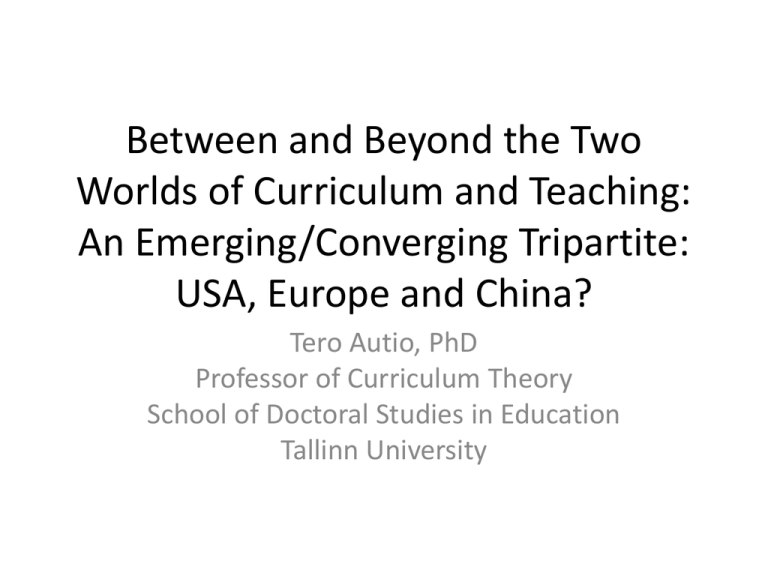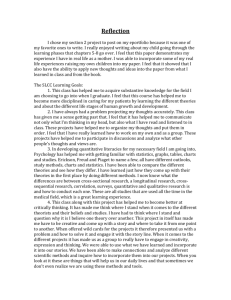Between (and beyond) of Two Worlds of Curriculum and Teaching
advertisement

Between and Beyond the Two Worlds of Curriculum and Teaching: An Emerging/Converging Tripartite: USA, Europe and China? Tero Autio, PhD Professor of Curriculum Theory School of Doctoral Studies in Education Tallinn University The significance of education policy for teaching practice • It is often misguided to speak about teaching and learning without articulated connection btw education policy, curriculum, teaching, learning and study • Education policy adopted matters more than any theories of learning in curriculum and teaching practice • Present education policy = assessment and audit in terms of imagined economic competitiveness without any further analysis of the role of education in society • Education policy creates the pedagogic time-space for teachers’ work and professional identity • Teachers should be theoretically aware how education and curriculum policy shape teachers’ professional identities and their work (“extended professional competence”) The Educationalization of the Cold War • Sputnik Shock prompted the founding of the OECD 1960 • The first meeting was occupied only by economists and the military: not a single education expert was present • The enemy was not only Russians but PROGRESSIVE PEDAGOGY (DEWEY) AND POWERFUL TEACHER UNIONS • The ideal school institution work like successful factory or military organization, education as a cog in production machinery • The adoption of accountability, standardization, privatization as key terms in education policy with far-reaching consequences to teachers’ work: teaching is essentially teaching to the the test • The replacement of moral discourse by the rhetoric of “quality” and “excellence”. “quality assurance systems” etc. The current hegemony in transnational education policy • “Global Education Reform Movement, GERM, a virus that kills education” (Sahlberg,P. 2011 Finnish Lessons) • PISA is the result of the educationalization of the Cold War • Sputnik shock in the US in 1957: scientification of the school curriculum (set theory in math); focus on core subjects math, science and foreign language(s), cf. PISA today! President Obama’s education policy: Through Race to the Top • Adopting standards and assessments that prepare students to succeed in college and workplace and to compete in the global economy • Building data systems that measure student growth and success, and inform teachers and principals about how they can improve instruction: “leadership by numbers” • Recruiting, developing, rewarding, and retaining effective teachers and principals where they needed most; and • Turning around our lowest-achieving schools • 1,35 billion dollars 2011 • (Taubman 2009; Teaching by Numbers) -----------------------Today: Economic thought is coterminous with rationality! Rationality in the French Enlightenment: Liberté, égalité, fraternité The big picture of modernization: to be is is to think; to think is to calculate Curriculum? • Curriculum is organizational and intellectual centerpiece of education • What is the balance between the organizational and intellectual creates the divide btw Anglophone and North European curriculum theories and powerfully shapes teacher’s professional identity and the nature of her/his work • Curriculum studies: curriculum theory + curriculum history + curriculum design • Education is a mix “zwischen Politik und Wissenschaft”; F.D.E Schleiermacher, the founder of hermeneutics (1768-1834) Divide btw Curriculum and Didaktik … • In Anglo-American context the stress have been on the organizational understanding of the curriculum; in North Europe on both: organizational and intellectual • In A-A curriculum thinking education is sciencedriven (psychology, learning sciences); psychology and science as political construct • In NE Bildung/Didaktik traditions the nation state is the “objective framework” (Weniger) of education; education and curriculum are political matters Herbart as a pivotal figure in both traditions • Also the Anglo American curriculum theoretically derives from German sources, particularly from J.F. Herbart’s (1776-1841) mechanist variant of psychology based on the ideal of Newtonian classical mechanics; • Herbart had also a hermeneutic variant of psychology that was instructive in the development of Bildung traditions, psychoanalysis and Vygotsky’s psychology • Herbart’s own ambition was “in die Geschichte als Newton der Psychologie einzugehen” Herbart, behaviorism, cognitive theories, learning sciences • Herbart’s mechanist image of psychology à la Newtonian classical mechanics was adopted as an intellectual cornerstone in the Anglo American curriculum theory • H was instrumental in the emergence of behaviorist psychology and later on in the whole parade of cognitive theories and learning sciences that share the basic assumptions of Herbart’s mechanistic psychology and behaviorism • the main bias throughout that intellectual tradition is the void of any convincing notion of consciousness, subject, agency and personality, the lack already present in the S-O-R schema • Edward Thorndike (1874-1949): Education is the form of human engineering • F. Bobbitt, The Curriculum, 1918: Education is not very dissimilar from railway building A shift from a behavioral paradigm to a cognitive one.. (Taubman 2009) • Behaviorism’s dismissal of the unpredictability of human subjectivity, human relations and individual personality, and its optimism that behavior could be “conditioned” lent itself to the command-and control-emphasis of the military • The emphasis from strict focus on behavior to internalized representations of that behavior, but the focus on discrete tasks, expediency, and end results remained, since the military’s need for command and control, predictability and efficiency only intensified with the procurement of innovative technologies. • The easy quantification of behavioral outcomes articulated nicely with the metrics of computer processing and the statistical norms and values already incorporated in psychological research. Implications for the present education policy: “How the learning sciences came to be complicit in the corporatization of education? • “The rise of cognitive science and the intimate relationship between the military, computer scientists, and psychologists” (Noble 1991) is important in helping us to understand the roots of our current education. • Those psychologists (Gagné, Glaser, Mager) who had one foot in the military and one in education contributed to the development of the learning sciences and to the importation into education of language of outcomes, performance objectives, and information processing. Learning sciences: from knowledge to information • The synergy between computer scientists, information processors, and cognitive psychologists not only generated new metaphors of thinking and behavior but also resulted in conceptualize knowledge as information (“skills and competences” in curricula) • The reduction of knowledge to information may have fitted information and learning sciences with metaphors of thinking as information processing, but it also hid the labor and desire involved in the creation of knowledge, its historical context, and its complexity, contingency, and ambiguity. The political and moral “neutrality” of Learning Sciences • Taubman 2009: how “tools” or “tool kits” created by information technologies are used, to what purpose, is not the concern of the learning sciences. Whether they are used used to forward the agenda of a military in time of war or neoliberal policies in a time of economic inequities, the learning sciences appear not to care. • The lack of the moral in Learning Sciences, present in Didaktik traditions; the moral component of the curriculum “makes education educative: to encourage thinking, to make subjective yet knowledgeable judgment and decisions, to think against the subject matter, to think against oneself, to transcend, to transform” (Autio 2014) • If consciousness is superfluous – as behaviorism and Learning Sciences assume - why we have it ? “Curriculum and Bildung/Didaktik are very different intellectual systems” (Westbury) The image of the teacher in the Anglo-American Curriculum The image of the teacher in the Bildung/Didaktik tradition • • • • • Teacher’s role as the intellectually passive “agent of the system” (Westbury 2000) in the AngloAmerican curriculum tradition Teacher-proof curricula; ”existing teachers are a (if not the) major brake on the innovation, change and reform that the schools always seem to require” (Westbury 2000) Curriculum-as-manual; a very limited space for professional autonomy, freedom and judgment Teaching essentially means teaching to the test • • • • Curriculum is an organizational and intellectual centerpiece of education “An autonomous professional teacher … has complete freedom within the framework of the Lehrplan (curriculum) to develop her/his own approaches to teaching” (Westbury 2000) This relationship btw the curriculum and the teacher; teacher as the curriculum maker is traditionally internalized and respected especially in the Scandinavian countries (Singapore, Canada – and Estonia?) Curriculum: Subjectivity is threaded through subject matter; we all come to the world through curriculum High trust in highly educated teachers “When China rules the world” (Martin Jacques); “liberalization and modernization reforms” in education since 2000 • Curriculum as organizational and intellectual centerpiece of education; teaching as an intellectual task; ideally “academic freedom to teach” • China is not the “nation-state” and not yet the “market state” as most Western states, but the “civilization state”; communism and capitalism are conceived of recent Western imports against the 7000 years of Chinese “wisdom traditions”: Buddhism, Confucianism, and Taoism. China has seven hundreds years’ experience of Islam culture too. China…. • Shifts from centralized bureaucratic hierarchies to more dynamic structures by creating “information flows” between schools, universities, and local, regional and central administration • Increase in the administrative and curriculum autonomy of schools and teachers: “from the follower to the subject of reform”; collaboration and cooperation instead of competition • From authoritarianism of Soviet pedagogy (I. I. Kairov) to “celebrating difference and diversity”; postmodern accounts of education and curriculum theories (btw 20002012 over 1200 books and articles under the title of postmodern/poststructural education and curriculum theories) China’s current curriculum conception • Curriculum (Ke Zheng); “No Freedom, No Curriculum” (professor Zhang Hua) • Curriculum studies = curriculum theory + curriculum history + curriculum design create the center of educational sciences • Curriculum theory is conceived as an interdisciplinary update of the traditional four boxes model of educational sciences: history, philosophy, psychology, and sociology of education • Teacher as THE curriculum theorist: “extended professional competence”



